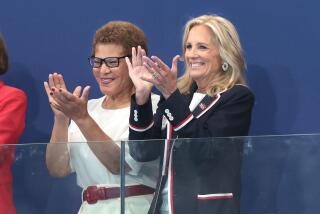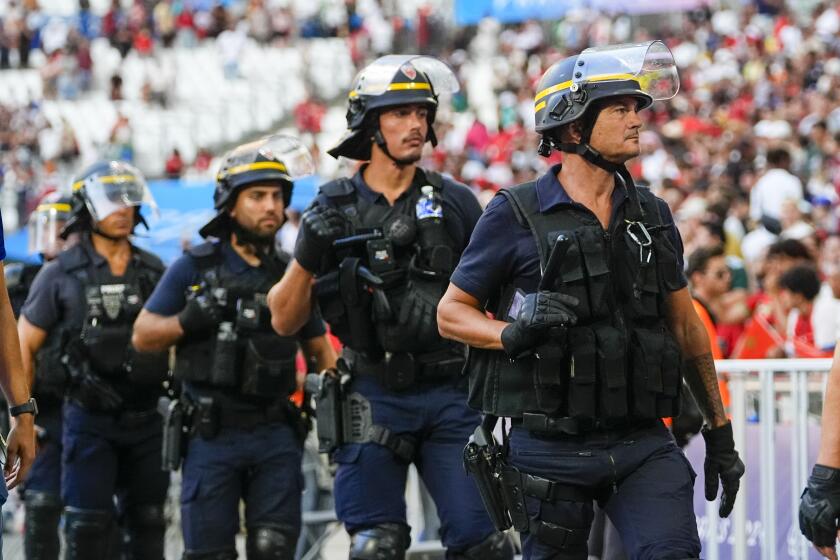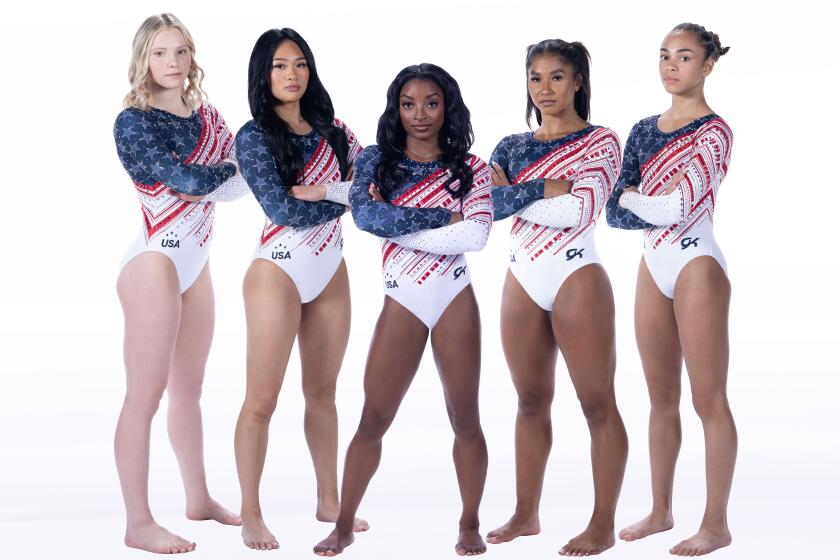The Games Plan for China: Olympic Superpower by ’08
She’s too young to compete this month at the Summer Games in Athens, but sturdy 8-year-old gymnast Situ Shiyi knows her nation’s future Olympic success may well rest partly upon her tiny shoulders.
“Someday, I’d like to win a gold medal,” the 65-pounder said last week after a floor mat routine at the Shichahai Sports School here. “It would make my mother proud.”
Situ might not have to wait long to realize her dream. With little fanfare, China is emerging as an Olympic heavyweight that could soon challenge the United States and Russia for the biggest harvest of gold medals and national pride.
While acknowledging the gap that remains between some of its own top-level athletes and the world’s best, China has set its sights on the 2008 Beijing Games to make a statement about its growing athletic excellence before millions of hometown fans.
“When an athlete wins a medal, they hoist their flag and sing the national anthem, which is a defining moment of national pride,” said Ren Hai, a professor at Beijing Sports University. “And what better place for it to happen than before your own people?”
The makeup of its contingent headed for Athens shows how much Team China is banking on the future. With 407 athletes, it is the nation’s largest Olympic roster ever and will compete in every sport except equestrian and baseball. It is also China’s youngest team, as officials hold back some veteran gold-medal winners to make room for promising newcomers who might be stars in 2008.
China did not compete in the Olympics between 1952 and 1980. But since then, it has reinvented itself from an athletic paper tiger into a ferocious Olympic competitor, winning a national-best 28 gold medals at the Sydney Summer Games in 2000.
And signs suggest the Chinese are far from satisfied with that count.
“China knows it has a modern history of political humiliation. And when we finally opened ourselves to the outside world 100 years ago, we realized how left behind we were,” said Zhao Yu, a sports historian whose book “Superpower Dream” chronicles China’s Olympic efforts. “That’s why gold medals weigh so much to Chinese people.”
China’s Olympic resurgence has other countries watching carefully -- including the United States, acknowledged Jim Scherr, chief executive of the U.S. Olympic Committee.
China has 17,000 in its elite athlete training system. The USOC has capacity for permanent training for 1,000, Scherr said. Outside the United States most Olympic programs are run or funded by the government.
As an individual incentive, China is considering increasing cash bonuses for its Olympic medal winners in Athens. In a country where residents on average earn about $1,000 a year, gold medalists already earn an $18,000 bonus.
The country’s “gold-medal strategy,” a battle plan approved by Beijing bureaucrats, focuses on developing women’s sports, which officials here say are underfunded in many countries. Illustrating Mao’s Tse-tung’s saying that “women hold up half the sky,” China’s women won more than half the nation’s medals in Sydney. And in this year’s delegation, women outnumber men, 269 to 138.
“There’s no question that they are making a significant effort, in fact leaving nothing to chance to win the medal count in 2008,” Scherr said. “That is their stated goal as a national Olympic committee, and I think as a country for those Games. They certainly want to showcase the best qualities of their society and winning the medal count would help them do that -- as well as hosting excellent Games, which they’re sparing no expense in doing.”
Chinese officials intend to spend $30 billion readying Beijing for the 2008 Games, more than double the original cost projection.
At any rate, Scherr said, “we have our work cut out for us.”
The Chinese, meanwhile, must convince skeptics that their Olympic sports program is no longer seeking success through doping.
During the 1990s, 32 Chinese swimmers were caught for drug offenses. In 1998, Australian customs inspectors found 13 vials of human growth hormone hidden in the luggage of one Chinese swimmer.
Just days before the start of the Sydney Games, China withdrew 27 athletes, including 14 track and field athletes, from its Olympic team, saying an anti-doping program had turned up “suspicious” results. The Chinese also pulled 13 officials, including controversial track coach Ma Junren, who claimed his runners won because they trained at altitude and ate a diet spiced with turtle blood and caterpillar fungus.
Chinese officials say they now have one of the world’s strictest anti-doping policies, though steroids remain easy to obtain here.
Although China has traditionally been strong in such events as gymnastics, diving, table tennis and badminton, its Olympic officials also are concentrating on more glamorous sports such as basketball and track and field. Anchored by the towering NBA star Yao Ming, China may be well on its way to developing its own Olympic hoops Dream Team.
In Sydney, China’s only track-related gold medal came in a women’s walking event. This June, five-time Olympic gold-medal winner Michael Johnson of the U.S. traveled to Beijing to work with Chinese athletes. Johnson’s visit was part of China’s “119 Project,” referring to the 119 gold medals available in track and field and aquatics.
China will take 138 more athletes to Athens than it did to Sydney, many of them first-timers. Several veteran stars such as badminton world champion Xia Xuanze and diver Li Na -- who won two gold medals in Sydney -- will be left behind.
Some say China is willing to forgo gold in Athens to bank on Beijing in 2008.
“We really want to take the opportunity provided by the Athens Games to let more young Chinese athletes participate in additional events so we can accumulate more experience for the Beijing Games,” Chinese Olympic official Li Furong told reporters.
China’s history in the modern Olympics dates to the first Los Angeles Summer Games, in 1932 -- with one athlete, Liu Changchun. He was eliminated in the preliminary rounds of the 100- and 200-meter dashes.
China took part in the 1936 Berlin Games, and again when the Games resumed after World War II in 1948 in London, winning no medals.
Thereafter, from the 1952 Games in Helsinki through the 1980 Games in Moscow, mainland China did not take part. For most of those years, “China” in the Games meant Taiwan -- owing in large measure to opposition to Communist China from Avery Brundage, an American who served as International Olympic Committee president from 1952 to ’72.
It wasn’t until the second Los Angeles Games, in 1984, that the mainland Chinese reappeared. Now China and Taiwan compete -- although Taiwan appears as Chinese Taipei.
Tensions remain high, even in Athens, where the Taiwanese have taken out ads on buses extolling their sports program.
“For almost all those years, China was actively campaigning to try to get back into the IOC,” said Susan Brownell, a professor at the University of Missouri-St. Louis and author of a 1995 book about sport in the People’s Republic. “There’s a perception in the West they were boycotting. That’s not fair. The amount of diplomatic effort they were putting out shows how much they wanted to be a player.”
In Los Angeles 20 years ago, China won 32 medals, including the first gold of the Games, in shooting -- by Xu Haifeng, now a national hero. By 2000, China had risen to third overall and in the gold-medal count, behind the U.S., which won 39, and Russia, which received 32.
The United States and China recently announced plans for a “sports summit,” starting next June in Seattle -- presumably to scout each other’s teams.
Asked whether the U.S. and China might develop a rivalry like that between the U.S. and the former Soviet Union, which animated the Olympics during the Cold War, Scherr said he anticipated only a “friendly rivalry.”
“As a world rival to the United States on the world stage, with its population and economic resources and growing economic abilities, and as that translates to sport, I think right now you’re seeing them emerge,” he said.
But even China’s first gold-medal winner cautioned that Olympic supremacy would take years.
“It’s possible that China will become the country which wins the most gold medals in the Olympics but it takes time, because we are still quite weak in track and field,” said Xu, who now coaches the Olympic shooting team. “It will at least take one or two generations of effort to make it to the top.”
Underscoring the intense preparation effort, some 4,000 sports schools -- most featuring barracks-style housing -- are now competing to join 200 nationwide that will receive additional government funding in their efforts to produce Olympic-caliber athletes.
In 40 years, the Beijing Shichahai Sports School has trained 3,000 competitors -- 25 of them becoming world champions in events such as gymnastics, table tennis and chess.
This year, four Olympic competitors have been chosen from the school’s 500 students. But Liu Hongbin, the institute’s director, feels the pressure to keep producing winners, so he is offering bonuses to any of the school’s 50 coaches whose students claim Olympic gold at Athens or in any future Olympics.
“If we don’t win gold, it would be seen as a shame,” he said.
Student-athletes at the school as young as 6 often are away from home for years as they perfect their routines.
The pressure takes its toll. Young Situ Shiyi says she doesn’t miss her mother as much as she used to. Martial arts student Gao Jing, 14, knows the five years spent at the school have caused her to miss out on some of the fun of being a teenager.
But the sacrifices will be worth it if her sport one day becomes an Olympic competition. That way she can try to bring home the gold.
“That would be great, to win a gold medal,” said Gao. “It would be great for China.”
Glionna reported from Beijing, Abrahamson from Athens.
More to Read
Go beyond the scoreboard
Get the latest on L.A.'s teams in the daily Sports Report newsletter.
You may occasionally receive promotional content from the Los Angeles Times.








